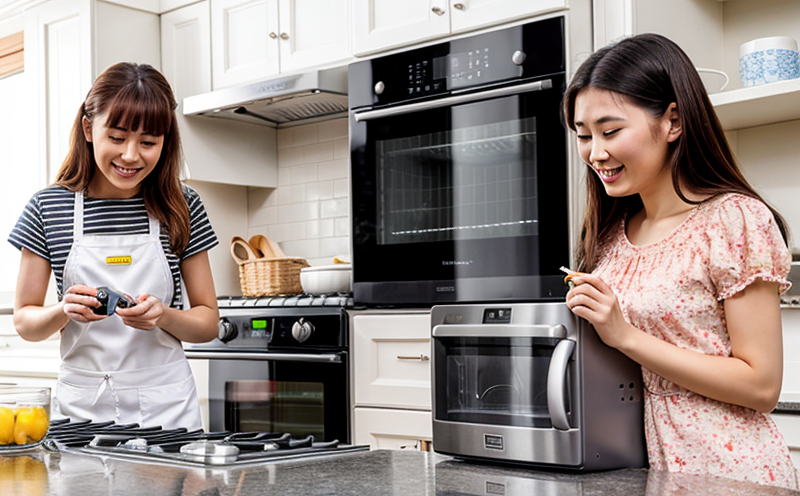UL 1082 Household Coffee Maker Safety Testing
The UL 1082 standard specifically addresses safety requirements for household coffee makers. This includes electrical and mechanical aspects that ensure the product is safe to use in homes. Compliance with this standard is crucial as it helps protect consumers from potential hazards such as overheating, short circuits, or physical injuries.
UL 1082 covers a range of tests designed to evaluate different components and functionalities of coffee makers. These include insulation resistance testing, moisture resistance testing, mechanical stability checks, and more. The standard also sets out strict limits on the maximum temperature that can be reached during normal operation and under fault conditions.
Manufacturers who wish to market their products in North America must comply with UL standards. This not only ensures product safety but also enhances consumer confidence, leading to better sales performance. By adhering to these rigorous testing protocols, companies demonstrate a commitment to high-quality manufacturing practices and regulatory compliance.
The process begins with thorough pre-test inspections of the coffee maker units. This involves visual checks for any obvious defects or inconsistencies that could compromise safety standards. Once approved, the devices undergo various functional tests to assess their performance under different operating conditions. For instance, temperature stability tests ensure that the machine maintains safe temperatures throughout its lifecycle.
Another critical aspect of UL 1082 testing is ensuring proper labeling and documentation. This includes verifying all labels meet regulatory requirements regarding size, legibility, and placement within visible areas on the product. Additionally, detailed records must be kept for every test conducted, including date, time, operator initials, batch number, results obtained, and any observations made during the procedure.
In summary, UL 1082 is a vital component in safeguarding public health by preventing dangerous incidents related to household coffee makers. Compliance with this standard provides peace of mind for consumers while fostering trust among stakeholders involved in product development and manufacturing processes.
Why It Matters
The importance of UL 1082 Household Coffee Maker Safety Testing cannot be overstated. It serves as a critical safety net that protects consumers from potential dangers associated with faulty electrical appliances. By ensuring adherence to this standard, manufacturers can significantly reduce the risk of accidents and injuries caused by overheating or short circuits.
Compliance also plays an essential role in maintaining brand reputation and customer trust. When products meet stringent safety criteria like those outlined in UL 1082, it reassures consumers about the reliability and quality of their purchases. This trust can translate into higher sales volumes and loyal customer bases.
From a regulatory perspective, meeting these standards helps businesses avoid penalties and fines imposed by government agencies responsible for enforcing product safety laws. Non-compliance could lead to costly recalls or even legal actions against offending companies. Therefore, investing in thorough testing ensures ongoing adherence to regulations without compromising on quality.
In terms of innovation, UL 1082 encourages manufacturers to constantly improve their products by identifying weaknesses and addressing them proactively through continuous improvement initiatives. This fosters a culture of excellence where safety is prioritized alongside other key performance indicators such as efficiency or design aesthetics.
Lastly, complying with this standard enhances international competitiveness for companies operating globally since many countries recognize UL certification as proof of meeting local standards equivalent to their own national regulations.
Scope and Methodology
The scope of UL 1082 covers various types of household coffee makers, including drip brewers, percolators, and espresso machines. The methodology involves a series of tests aimed at evaluating different aspects such as electrical insulation resistance, moisture resistance, mechanical stability, and safety features like overheat protection.
For instance, the electrical insulation resistance test measures how well the coffee maker's internal components are isolated from each other to prevent short circuits. This is crucial because even minor breaches in this barrier could lead to severe shocks or fires if not properly addressed during design and manufacturing stages.
The moisture resistance test assesses whether water exposure affects the electrical performance of the device, particularly around areas where liquid comes into contact with electronics. It's important because coffee makers frequently come into contact with water during use, so it must be designed to withstand such conditions without compromising its functionality or causing harm.
Mechanical stability tests check how robustly constructed various parts are against everyday wear and tear. This ensures that the product remains stable even when subjected to forces like shaking or dropping during normal usage scenarios. Robust construction enhances durability, which is vital for maintaining optimal performance over time.
The safety feature checks focus on verifying that all necessary safeguards are incorporated into the design. These might include temperature control mechanisms that prevent overheating, automatic shut-off functions in case of malfunctions, and robust power cords capable of handling high current loads without failing.
Eurolab Advantages
Eurolab offers comprehensive services for UL 1082 Household Coffee Maker Safety Testing. Our experienced team comprises highly skilled engineers and technicians who possess deep expertise in this field, allowing us to deliver accurate and reliable test results consistently.
We utilize state-of-the-art equipment that adheres strictly to international standards such as ISO/IEC 17025 for calibration accuracy. This ensures our tests are repeatable and reproducible across multiple trials, providing clients with consistent quality assurance data.
Our facilities are equipped with advanced testing stations capable of simulating real-world operating conditions accurately. From high-temperature environments to rapid moisture cycling chambers, we can replicate a wide range of scenarios that might affect the performance of coffee makers under various environmental stressors.
The comprehensive nature of our service extends beyond just conducting tests; it also includes providing detailed reports outlining all findings along with recommendations for improvements if necessary. These reports serve not only as compliance documentation but also valuable tools for internal quality control departments within organizations seeking continuous improvement opportunities.





